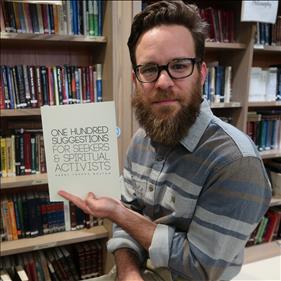Writing out loud

Rabbi Joshua Bolton, director of the Jewish Renaissance Project and Senior Jewish Educator at Penn Hillel, is out this month with his first book, One Hundred Suggestions for Seekers and Spiritual Activists (Alternadox Press), already being hailed as “a new type of Jewish roadmap for the millennial generation.”
Hillel News sat down for a Q&A with Bolton as part of our ongoing Hillel authors series. What follows are highlights from that conversation. (Answers have been edited for length.)
Why did you write this book?
I didn’t realize I was writing a book until much of the material was already composed. Almost the entire text was written on social media. It’s a collection of Facebook posts, lists that I jotted down riding on trains, and emails to students. Some of the pieces were written when I was serving as a guest blogger here and there. Friends and colleagues kept saying to me, “You should write a book!” At some point I finally realized that I had been working on a collection for several years.
One Hundred Suggestions can be read as a memoir, each page a window onto a different scene of an inner landscape. I wanted to tell a story, and to invite readers into my own personal search for meaning and authenticity.
What was your hypothesis when you started writing? Did it change?
If there is a singular organizing principle throughout it is the assumption that I might as well just be totally honest about everything. Tell of my passionate spirituality, my self-doubt, my history, my aspirations – everything.
How did your students influence your conclusions?
Somewhere in the ancient past an important sage said something to the effect of having learned much more from his students than from his own teachers. That’s deeply true for me. Through all my work with the Jewish Renaissance Project, I end up being much more the audience, on the receiving end. I have found the entire teacher/student paradigm to be upended. The students teach me through the idiosyncrasies of their own questions. They teach me to look at texts differently.
Could you state your conclusion on one foot?
Speak to the homeless.
What is the difference between a religious and a spiritual person? Can one be religious without being spiritual? The reverse?
I don’t think there’s a “neat” answer. I would suggest that “spirituality” in the way it gets used today is an expression and phenomenon that comes to us via the New Age. One of the most pronounced characteristics of spirituality in this sense is how it’s focused almost exclusively on the self. There are books and articles about this. When someone tells me “I’m spiritual but not religious” (and this is told to me a lot), with a little bit of probing you often discover that the speaker is saying something to the extent that they don’t feel bound to or inspired by the ritual and communal and rhythmic obligations of the inherited tradition from which they stem. In other words: the primacy of the self as ultimate arbiter and agent. I obviously understand and reflect that perspective. I have struggled to integrate a more “religious” posture into my life, one that displaces the self. It’s not easy, but I think it’s important. The tension between spirituality and religiosity in this sense is basically the tension between the ancient and contemporary worlds. We all have it within us.
What was the greatest challenge in writing this book? The biggest surprise?
I wrote it in this very public setting (Facebook) and was engaged in an experiment around how much I could reveal (about myself, my reflections on campus life and the Jewish communal apparatus, etc.). I pushed the boundaries of what was kosher from a personal and professional perspective, and at times I inadvertently crossed those boundaries. I had a lot of mentorship and support and a few people who would call me up to tell me I had to reel it in, I had to delete the post. These were pretty emotional moments for me actually. It involved trying to balance my professional role and the important boundaries that we uphold as rabbis and Hillel professionals alongside really deep things that wanted to come out from within me. There was a tremendous challenge trying to determine where the lines were going to get drawn.
What did you learn about yourself during this process?
The writing of the book coincided with a period of intense personal growth and change. Much of that process was reflected to me in the writing of the book. Like many writers (and religious people too), I am often just a vehicle, a channel through which ideas and expressions emanate into this world. Sometimes I had rough understandings of the forms, but I nearly never anticipated the content. In this regard, everything I wrote, everything I said about myself, everything I acknowledged and admitted, everything I suggested, was all a surprise to me.